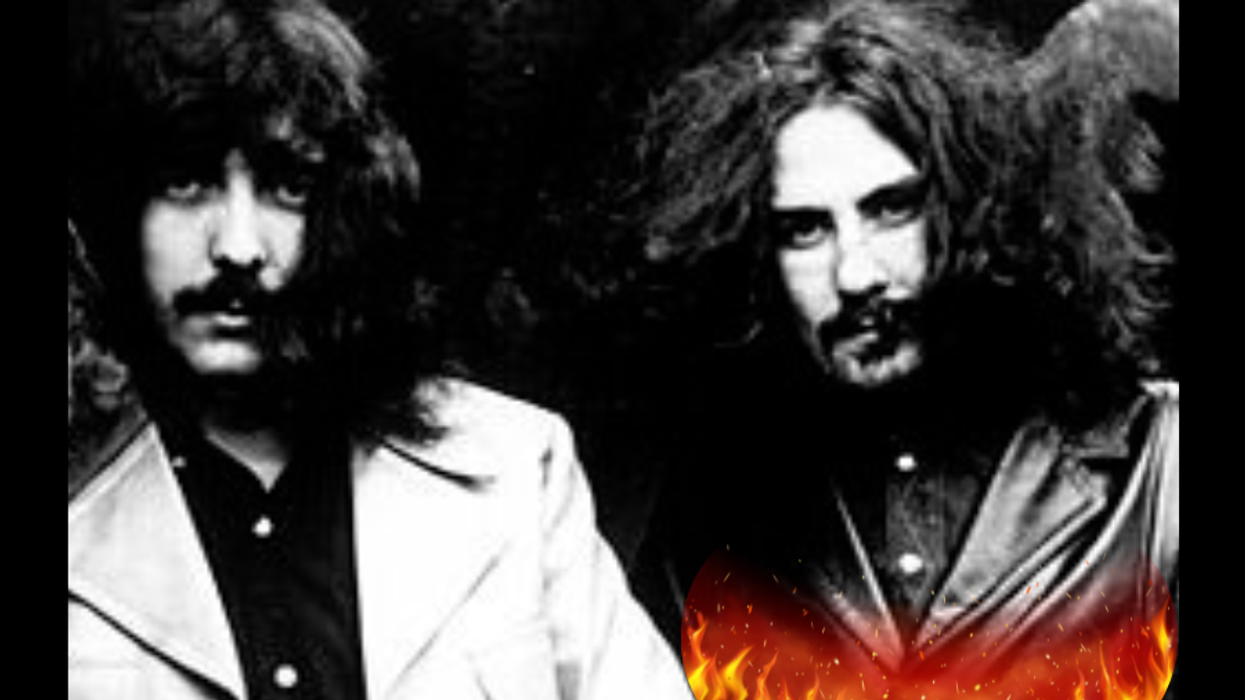"He was our outlet," Black Sabbath guitarist Tony Iommi told Guitar World in 1992, describing how the metal gods "picked on" their beloved drummer, Bill Ward. "I used to do terrible things to him." In one notoriously dangerous incident—which dates back to the 1972 recording sessions for Vol. 4, per Classic Rock—Ward's bandmates painted him gold from head to toe, leaving him in convulsions. "The ambulance people gave us a right bollocking: 'You idiots! You could have killed him,'" Iommi told The Guardian in 2016. "They gave him adrenalin, and we had to use paint stripper to get it off."
This wasn't the only time that messing with their bandmate led to a medical emergency. Back in the day, Black Sabbath made a "party piece" out of setting Ward on fire, apparently without causing harm—that is, until their final attempt, during the recording sessions for 1980's Heaven and Hell. "I asked, ‘Can I set you on fire, Bill?’ And he said, ‘Well, not now, not now.’ So I said, ‘Okay,’ and then forgot all about it," Iommi told Guitar World. "An hour later Bill said, ‘Well, I'm going home now. Do you still want to burn me, or what?’ I said, ‘Sure.’ So I got this bottle of petrol, tipped it on Bill, set fire to him and—voomph. I couldn't believe it! He went up like a Christmas tree. Well, he knew I was going to burn him, but he didn't know to what extent."
"Normally it just burned off, but this time it soaked into his clothes, so when I lit it he went up like a bomb," the guitarist recalled to The Guardian. "He was rolling on the floor, shouting and screaming." Thinking his reaction was "part of the joke," he "poured more stuff on him." They wound up calling an ambulance, and Ward suffered third-degree burns. "I felt bloody awful," Iommi said. "We still play jokes on each other. Not quite as severe as that. I learned my lesson."
- YouTubewww.youtube.com
Not all rock-star "jokes" take a physical toll. Some, like the hilarious extra-mile prank George Harrison played on Phil Collins, are just emotionally taxing. That story dates back to 1970, during the sessions for the former Beatle's first solo album, All Things Must Pass. Through a stroke of good luck, an unknown, 18-year-old Collins was hired to play congas on Harrison's song "The Art of Dying," alongside an all-star lineup that included Billy Preston (keyboards), Eric Clapton (guitar), and Phil Spector (production). Later, Collins excitedly went to buy the album but realized his playing had been left off the song.
Three decades or so later, Collins spoke to Formula One driver Jackie Stewart, a friend of Harrison's, who mentioned that All Things Must Pass was being remixed. Two days later, the drummer received a tape—a recording of "The Art of Dying"—from Harrison with a note that read, "Could this be you?" Collins recalled to Express, "Suddenly the congas come in—too loud and just awful." Harrison could be heard saying, "Hey, [Spector], can we try another without the conga player?" Later on, Stewart called Collins and put Harrison on the phone: "'Did you get the tape?' the songwriter asked. "Don't worry—it was a piss-take. I got Ray Cooper to play really badly and we dubbed it on. Thought you'd like it!" Brutal!
- YouTubewww.youtube.com



















 Volunteers who drive homeless people to shelters talk with a person from Ukraine in Berlin on Jan. 7, 2026.
Volunteers who drive homeless people to shelters talk with a person from Ukraine in Berlin on Jan. 7, 2026.
 Leonard Cohen performs in Australia in 2009.Stefan Karpiniec/
Leonard Cohen performs in Australia in 2009.Stefan Karpiniec/  Enjoying a sunset.Photo credit
Enjoying a sunset.Photo credit 
 An envelope filled with cashCanva
An envelope filled with cashCanva Gif of someone saying "Oh, you
Gif of someone saying "Oh, you
 Counterintuitively, social media can make you feel more bored and lonely.
Counterintuitively, social media can make you feel more bored and lonely. Talking about what you’ve read can add a social dimension to what can be a solitary activity.
Talking about what you’ve read can add a social dimension to what can be a solitary activity. 
 A flight attendant closes the overhead binCanva
A flight attendant closes the overhead binCanva Gif of Larry David trying to put his luggage in overhead compartment via
Gif of Larry David trying to put his luggage in overhead compartment via 
 Dog owner pets their dogCanva
Dog owner pets their dogCanva Gif of a sad looking pug via
Gif of a sad looking pug via 